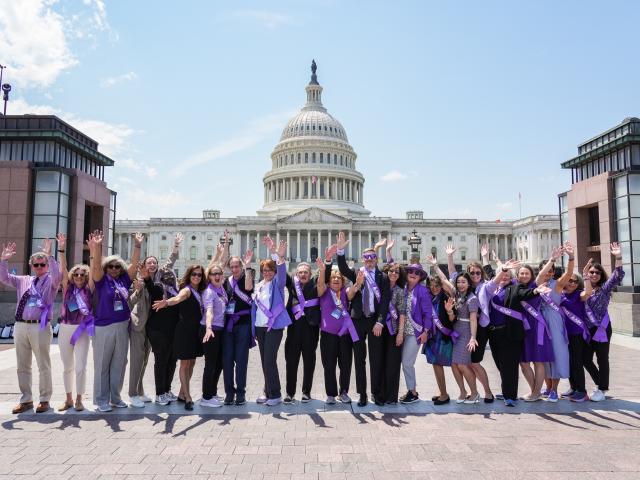Washington, D.C., March 9, 2022 — Congressional leaders have announced a $289 million increase for Alzheimer's and dementia research funding at the National Institutes of Health (NIH) for fiscal year 2022. The bill also includes $25 million to fund and implement the BOLD Infrastructure for Alzheimer's Act (P.L. 115-406).
"The additional $289 million in Alzheimer's research funding will drive innovation and improvements in care, treatment and prevention for Alzheimer's and all other dementia," said Robert Egge, Alzheimer's Association chief public policy officer and Alzheimer's Impact Movement (AIM) executive director. "Thank you to our advocates and bipartisan congressional champions for their support and commitment to the fight to end Alzheimer's."
Throughout the past year, the Alzheimer's Association, AIM and its dedicated volunteers throughout the nation advocated for this research funding increase. Sen. Roy Blunt (R-Mo.), Sen. Patty Murray (D-Wash.), Rep. Tom Cole (R-Okla.) and Rep. Rosa DeLauro (D-Conn.) have been instrumental in securing historic increases, and today's action demonstrates a renewed commitment to advance Alzheimer's and dementia research.
When the National Alzheimer's Project Act (NAPA), legislation championed by the Alzheimer's Association and AIM, was signed into law, the federal government invested just $448 million annually. Added to current National Institutes of Health (NIH) spending, the annual Alzheimer's and dementia research funding by the federal government will be as much as $3.5 billion.
In addition to supporting new research into Alzheimer's and all other dementia, the omnibus spending package includes $25 million to fund the BOLD Infrastructure for Alzheimer's Act. Passed with overwhelming bipartisan support in December 2018, the law directs the Centers for Disease Control and Prevention (CDC) to strengthen the public health infrastructure across the country by implementing effective Alzheimer's interventions focused on public health issues such as increasing early detection and diagnosis, reducing risk, and preventing avoidable hospitalizations.
The BOLD Infrastructure for Alzheimer's Act, which was championed by the Alzheimer's Association and AIM and will receive full funding for the first time since enacted into law, is an important first step toward addressing Alzheimer's as a widespread public health crisis.
The House and Senate are expected to pass the FY22 omnibus spending bill and advance it to the president, where it is expected to be signed into law.
